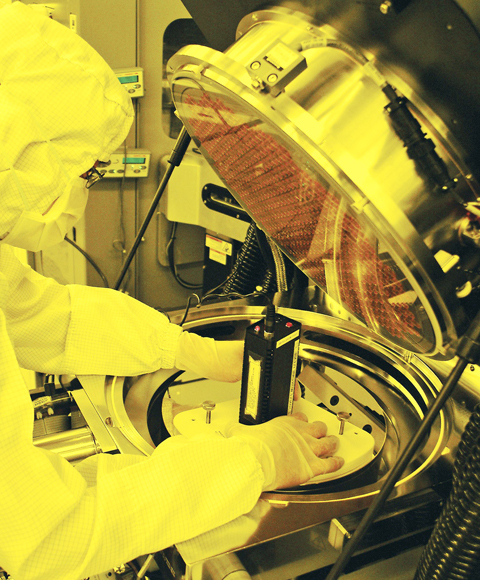To better satisfy customer demand, the world’s top contract chipmaker, Taiwan Semiconductor Manufacturing Co (TSMC, 台積電), announced that it plans to hike capital spending by 23 percent for this year after posting record-high net profits on rebounding demand for chips used in PCs and handsets yesterday.
TSMC’s net income soared 64.8 percent to NT$40.28 billion (US$1.26 billion) in the quarter ending June 30, compared with NT$24.44 billion a year ago, as strong demand led to tight supply of TSMC’s chips. On a quarterly basis, that represented 19.7 percent growth.
The Hsinchu-based chipmaker said spending on new equipment would rise to US$5.9 billion this year, again hitting a historical high from the previous estimate of US$4.8 billion.

PHOTO: REUTERS
“We have the responsibility to do our utmost to respond to customer demand,” TSMC chairman Morris Chang (張忠謀) told an investor conference in an attempt to alleviate investors’ renewed worries about overcapacity risk next year.
“Their demand for this year and their demand forecast for next year are both reasonably genuine ... We do not build capacity on speculation. In other words, we don’t first build capacity and then look for customers,” Chang said.
The TSMC chairman said sales growth on the global contract chip market would be 40 percent this year, higher than the 36 percent estimated in April. Next year, growth would be even higher, he said.
In response to overcapacity doubts based on massive capital expansion from the world’s major chipmakers like newcomer GlobalFoundries Inc and Samsung Electronics Co, Chang said: “I definitely do not think so.”
“For me, the biggest issue is that the company is not going to leverage gross margin on the growth of revenues,” said Steven Pelayo, a semiconductor analysis with HSBC Securities.
TSMC expected gross margin to be between 48 percent and 50 percent this quarter, compared with 49.5 percent last quarter. Revenues would rise to between NT$109 billion and NT$111 billion, representing an increase of between 3.8 percent and 5.8 percent from the NT$104.92 billion generated last quarter, the chipmaker forecast.
Customers “are still in line [for its chips], but the line is shorter now,” Chang said, in response to an analyst’s question about whether demand for chips made on advanced technologies still greatly exceeded supply.
Inventories on semiconductor supply chains or at chip companies are increasing, but the inventories would still be below seasonal demand at the end of this quarter, before rising close to the seasonal level by the fourth quarter, Chang said.
The company said demand for consumer electronics would be the strongest, followed by communications and computers.
Credit Suisse analyst Randy Abrams forecast that TSMC’s net income would rise further to peak at NT$41.34 billion in the period from this month to September, while weakening inventory restocking strength in the fourth quarter could mean slower growth for the chipmaker.
“Still, TSMC is a great defensive stock for investors during the slowdown,” Pelayo said.

SEEKING CLARITY: Washington should not adopt measures that create uncertainties for ‘existing semiconductor investments,’ TSMC said referring to its US$165 billion in the US Taiwan Semiconductor Manufacturing Co (TSMC, 台積電) told the US that any future tariffs on Taiwanese semiconductors could reduce demand for chips and derail its pledge to increase its investment in Arizona. “New import restrictions could jeopardize current US leadership in the competitive technology industry and create uncertainties for many committed semiconductor capital projects in the US, including TSMC Arizona’s significant investment plan in Phoenix,” the chipmaker wrote in a letter to the US Department of Commerce. TSMC issued the warning in response to a solicitation for comments by the department on a possible tariff on semiconductor imports by US President Donald Trump’s

The government has launched a three-pronged strategy to attract local and international talent, aiming to position Taiwan as a new global hub following Nvidia Corp’s announcement that it has chosen Taipei as the site of its Taiwan headquarters. Nvidia cofounder and CEO Jensen Huang (黃仁勳) on Monday last week announced during his keynote speech at the Computex trade show in Taipei that the Nvidia Constellation, the company’s planned Taiwan headquarters, would be located in the Beitou-Shilin Technology Park (北投士林科技園區) in Taipei. Huang’s decision to establish a base in Taiwan is “primarily due to Taiwan’s talent pool and its strength in the semiconductor

An earnings report from semiconductor giant and artificial intelligence (AI) bellwether Nvidia Corp takes center stage for Wall Street this week, as stocks hit a speed bump of worries over US federal deficits driving up Treasury yields. US equities pulled back last week after a torrid rally, as investors turned their attention to tax and spending legislation poised to swell the US government’s US$36 trillion in debt. Long-dated US Treasury yields rose amid the fiscal worries, with the 30-year yield topping 5 percent and hitting its highest level since late 2023. Stocks were dealt another blow on Friday when US President Donald

UNCERTAINTY: Investors remain worried that trade negotiations with Washington could go poorly, given Trump’s inconsistency on tariffs in his second term, experts said The consumer confidence index this month fell for a ninth consecutive month to its lowest level in 13 months, as global trade uncertainties and tariff risks cloud Taiwan’s economic outlook, a survey released yesterday by National Central University found. The biggest decline came from the timing for stock investments, which plunged 11.82 points to 26.82, underscoring bleak investor confidence, it said. “Although the TAIEX reclaimed the 21,000-point mark after the US and China agreed to bury the hatchet for 90 days, investors remain worried that the situation would turn sour later,” said Dachrahn Wu (吳大任), director of the university’s Research Center for